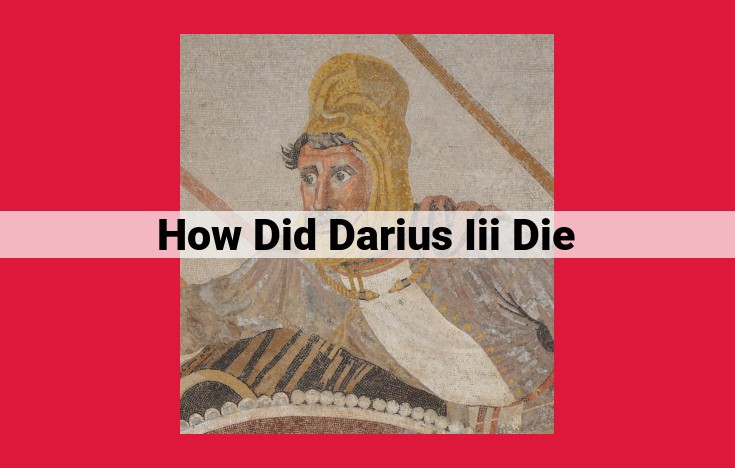After the defeat at the Battle of Gaugamela, Darius III fled eastward, pursued by Alexander the Great. Betrayed by his satrap Bessus, who claimed the Persian throne, Darius was captured and held prisoner. Bessus planned to hand him over to Alexander for a reward but was intercepted by Macedonian forces. In a skirmish that ensued, Darius was fatally wounded and died shortly after, marking the end of the Persian Empire and the beginning of Alexander’s reign.
Clash of Titans: Darius III and Alexander the Great
In the annals of ancient history, no conflict is more captivating than the clash between the sprawling Persian Empire and the relentless Macedonian juggernaut led by Alexander the Great. At the heart of this epic struggle were two formidable figures: Darius III, the ill-fated king of Persia, and Alexander, the embodiment of military brilliance and ambition.
Darius III: A King’s Downfall
Darius III ascended to the Persian throne in 336 BC, inheriting a vast empire weakened by internal strife and external threats. Arrogant and militarily incompetent, Darius proved to be an inadequate match for the Macedonian invasion. As Alexander’s forces surged into Persia, Darius made fatal mistakes that sealed his empire’s fate.
Alexander the Great: A Conqueror’s Destiny
Alexander, on the other hand, was a rising star whose military prowess and charisma propelled him to legendary status. Brilliant and ambitious, he sought to conquer the entire known world, and Persia lay directly in his path. With his innovative tactics and a ruthless determination, Alexander’s army proved to be unstoppable.
The Pivotal Battle of Gaugamela
The decisive battle between Darius III and Alexander took place at Gaugamela in 331 BC. Heavily outnumbered, Darius relied on his vast army, while Alexander’s forces were known for their superior training and tactics. The battle raged for hours, with both sides suffering heavy losses. Ultimately, Alexander’s brilliance prevailed, and Darius’s empire crumbled.
The Battle of Gaugamela: A Pivotal Clash Between Empires
The Battle of Gaugamela, fought on October 1, 331 BC, stands as a pivotal moment in world history, marking the end of the Achaemenid Empire and the rise of Alexander the Great’s Macedonian empire. The battle, fought on the plains of Gaugamela (modern-day northern Iraq), witnessed a titanic clash between two formidable armies.
Darius III, the last king of Persia, commanded a vast army of over 250,000 men, including elite Persian cavalry and mercenaries from across his empire. Alexander the Great, on the other hand, led a smaller but more disciplined force of around 47,000 troops, comprising Macedonian infantry, cavalry, and Greek mercenaries.
The battle began with Alexander’s army in a phalanx formation, with the infantrymen closely packed together, shields interlocking. Darius countered with a massive charge of chariots, but Alexander’s army held firm, using their sarissas, long spears, to bring down the charging horses.
As the battle raged, Alexander feigned a retreat with his cavalry, drawing a large contingent of Darius’s cavalry away from the main Persian line. Exploiting the gap, Alexander’s Companions cavalry charged through the weakened Persian center, aiming directly for Darius himself.
Panic ensued as Darius, fearing for his life, fled the battlefield, leaving his army to crumble. The Persian resistance collapsed, and Alexander’s victory was complete. The Battle of Gaugamela established Alexander’s empire as the undisputed dominant power in the ancient world. The victory paved the way for Alexander’s subsequent conquests, which extended as far as India, forever changing the course of history.
Closely Related Entities
Amidst the epic clash between Darius III and Alexander the Great, several other notable figures played pivotal roles in shaping the outcome.
Bessus: The Treacherous Satrap
Bessus, the satrap of Bactria, betrayed his king Darius III and seized the throne for himself. Driven by ambition and opportunism, he capitalized on Darius’s weakening position and declared himself the rightful ruler of Persia. Bessus’s actions not only shattered the unity of the Persian Empire but also paved the way for Alexander’s conquest.
Nabarzanes: The Opportunistic General
Unlike Bessus, Nabarzanes, a seasoned Persian general, switched sides and joined Alexander’s army. His military expertise and knowledge of Persian tactics gave Alexander a significant advantage in the Battle of Gaugamela. Nabarzanes’ betrayal further demoralized the Persian forces and contributed to Darius III’s defeat.
Oxathres: The Loyal Brother
In the face of adversity, Darius III found solace in the unwavering loyalty of his brother, Oxathres. Oxathres supported Darius throughout the tumultuous campaign, even after the Battle of Gaugamela. He helped Darius flee the battlefield and remained by his side until his tragic end. Oxathres’ loyalty serves as a testament to the enduring bonds of family and the human spirit amidst the chaos of war.
